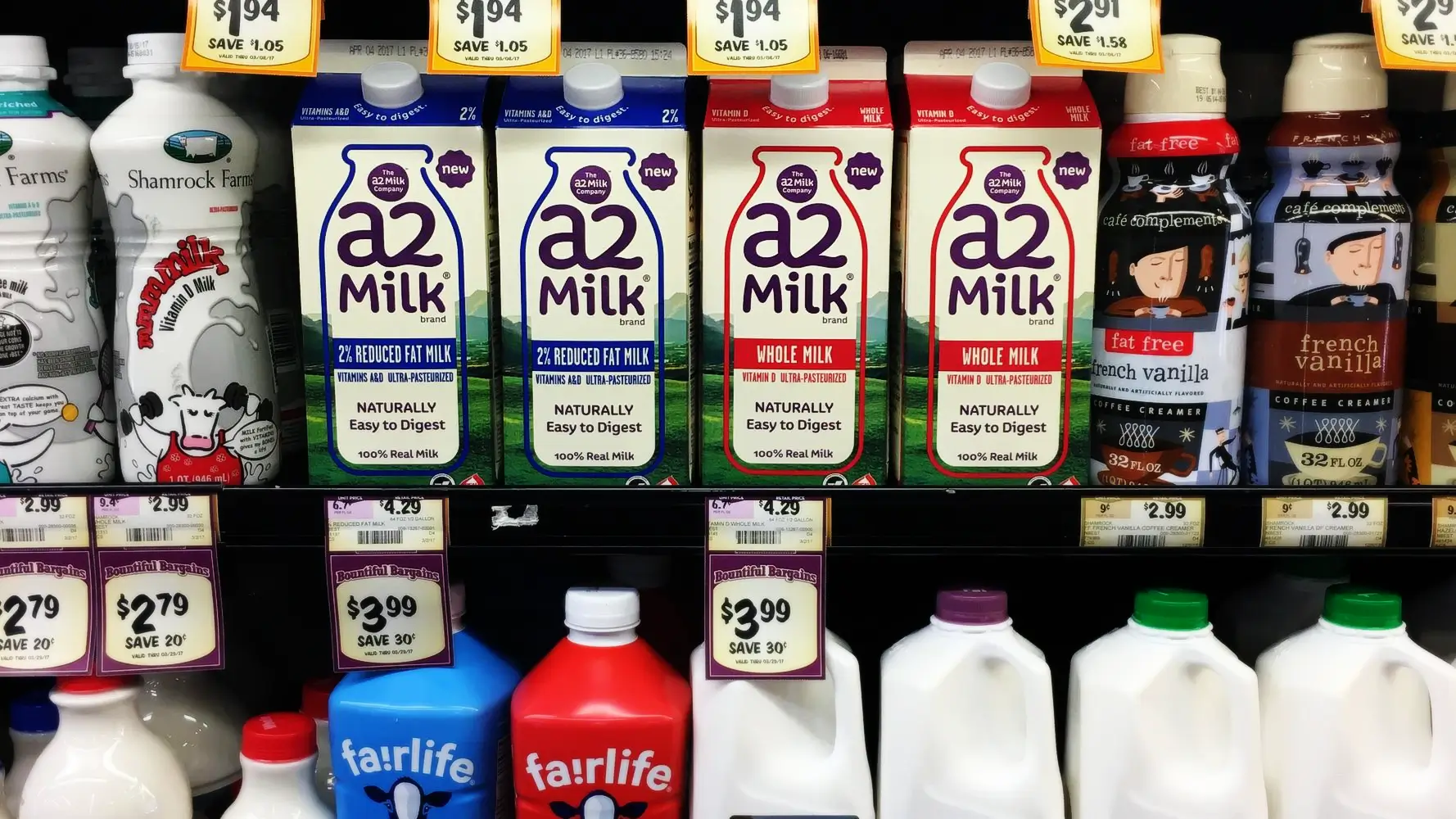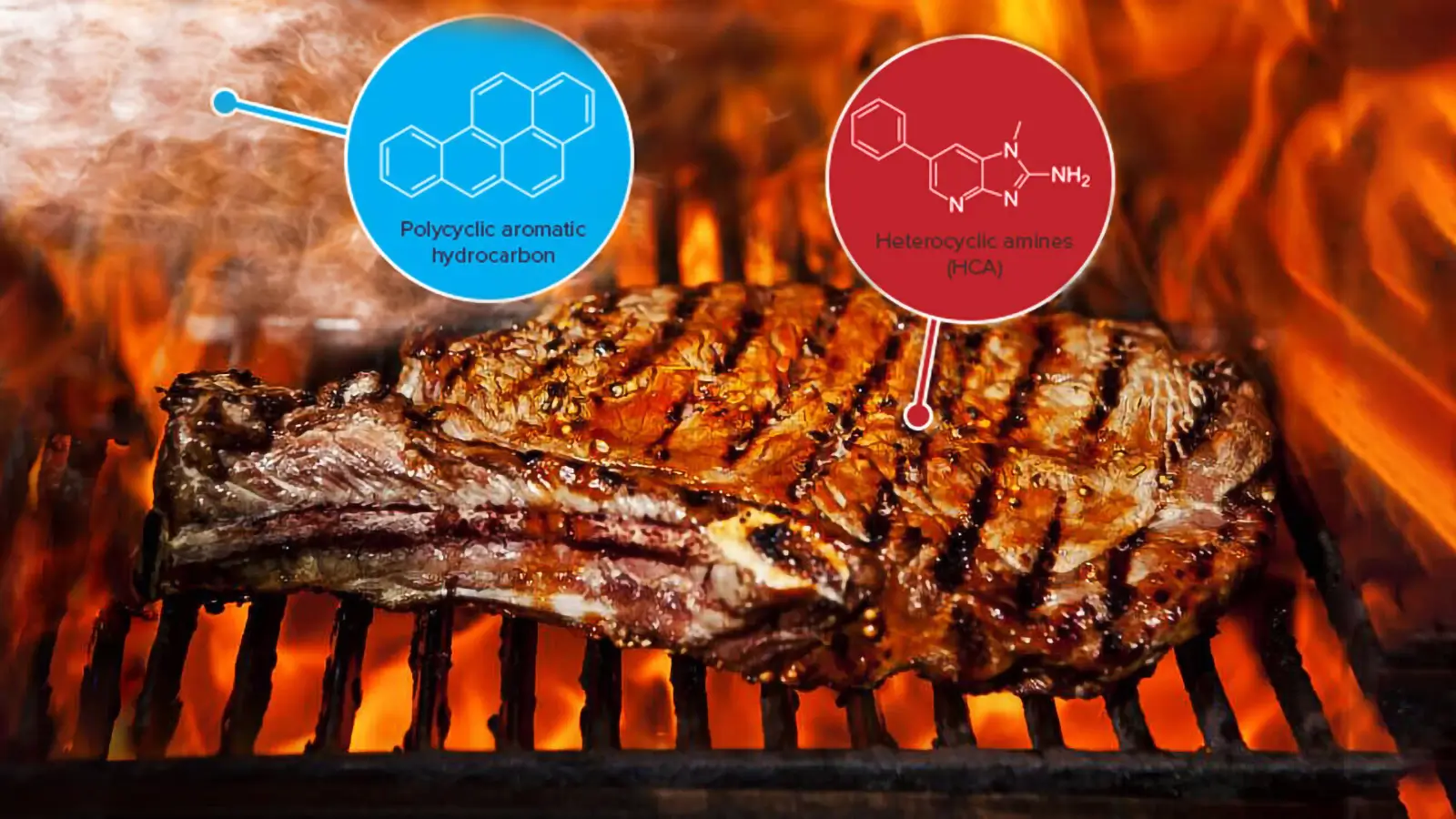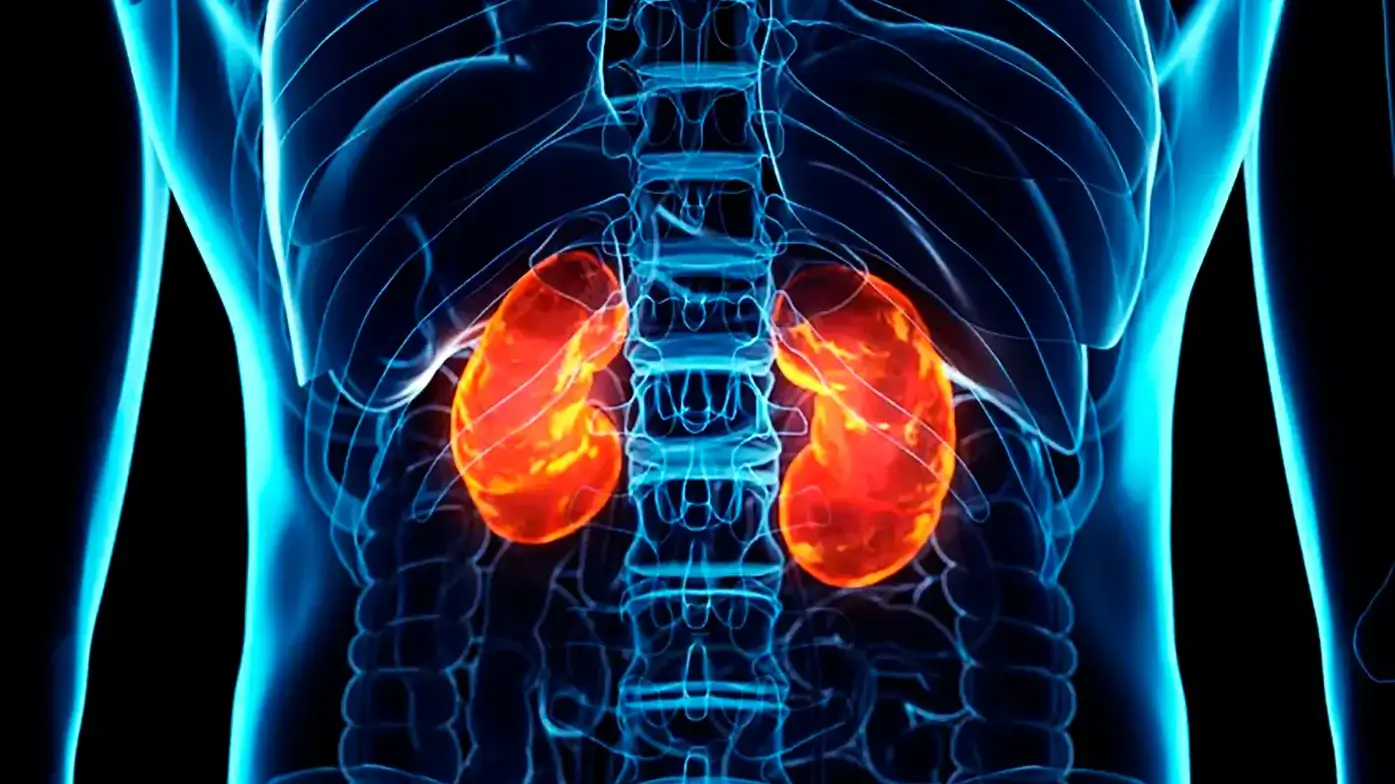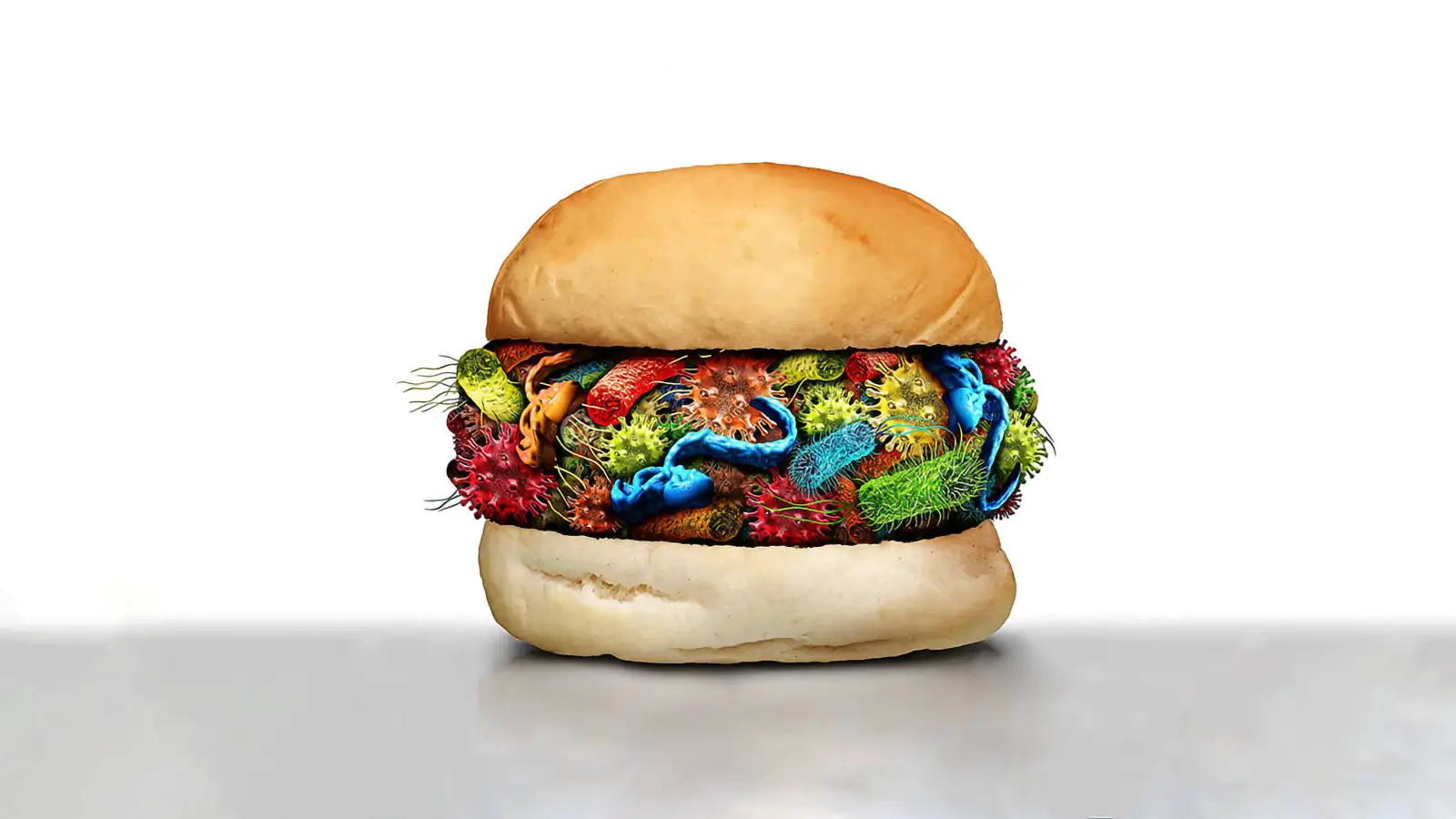Besoins en Protéines - Une Vérité Qui Dérange
Lorsque des études anthropologiques ont montré que les hominines vivaient en moyenne avec 15 à 20 grammes de protéines par jour, il y a eu ce qu'on a appelé le « grand fiasco des protéines » dans les années 1970.
Milos Pokimica
Écrit par : Milos Pokimica
Examiné Médicalement Par : Dr. Xiùying Wáng, M.D.
Updated mai 28, 2023Peut-être que l'une des questions les plus posées dans le mouvement végétarien et végétalien est :
Où as-tu trouvé ta protéine ?
C'est tellement ancré dans l'esprit subconscient des gens à travers toute la propagande et le marketing grand public que les protéines sont quelque chose d'essentiel sinon le plus important, donc si quoi que ce soit d'autre, nous devons consommer des produits d'origine animale pour obtenir des protéines. La deuxième question est :
Ok, si vous ne mangez pas de viande, pouvez-vous en obtenir à partir du lait ?
Nous devons trouver nos protéines quelque part. Si nous ne remplissons pas nos besoins en protéines, nous mourrons, donc si ce n'est pas de la viande, ce doit être du lait. Nous aborderons cette question du lait dans les articles correspondants (Lait et produits laitiers - Corrélations des risques pour la santé). De nombreuses personnes m'ont demandé où je trouvais mes protéines et, franchement, j'en ai assez de répondre à cette question. Alors enfin, faisons une véritable analyse scientifique de la question des protéines afin que vous puissiez comprendre correctement l'ensemble du "problème".
Si vous êtes vous-même végétalien, vous saurez exactement quoi dire aux gens lorsqu'ils poseront cette question, alors s'il vous plaît, restez dans les parages.
Premièrement, dans l'ensemble de la communauté de la nutrition, les protéines sont exclues comme quelque chose d'essentiel, sans poser de questions. Le véritable enthousiasme devient presque immédiatement après sa découverte. On l'appelait l'essence de la vie.
Dans les années 1890, l'USDA recommandait une moyenne de 110 g de protéines alimentaires par jour pour un homme moyen.
En 1950, même les Nations unies ont "reconnu" ce qu'elles ont appelé "le déficit mondial en protéines" et que, s'agissant des populations autochtones, "la carence en protéines dans le régime alimentaire est le problème le plus grave et le plus répandu dans le monde". Bien sûr, à cette époque, l'Amérique a connu après la guerre "un problème d'élimination des excédents" de lait en poudre.
Il existe même une maladie nommée Kwashiorkor découverte par le Dr Cicely Williams et attribuée à une carence en protéines. Le Dr Cicely Williams a passé la dernière partie de sa vie à démystifier la condition même qu'elle a découverte pour la première fois.
On découvrira plus tard que cela n'a rien à voir avec les protéines, mais plutôt avec certaines carences en acides aminés essentiels dues à des régimes alimentaires dominés par un seul aliment et à la combinaison d'une malnutrition générale. Il s'agit d'une malnutrition générale combinée à des carences en acides aminés essentiels, et non d'une carence en protéines, qui n'affecte que les enfants, et c'est là le consensus scientifique actuel. Mais même ce consensus pourrait être erroné. Il n'existe aucune preuve scientifique réelle d'une carence en protéines alimentaires, ce qui signifie des essais de contrôle par placebo en double aveugle. La véritable raison reste incertaine, mais les études de transplantation fécale suggèrent dans une certaine mesure des changements dans la flore intestinale qui pourraient être un facteur causal ou l'un des principaux facteurs. Même si la cause est une carence en acides aminés essentiels, le corps d'un adulte cannibaliserait une partie de la masse musculaire afin d'acquérir les acides aminés manquants en raison de la malnutrition. Et lorsque vous souffrez de malnutrition chronique et que vous ne pouvez acquérir qu'une petite quantité d'un seul aliment qui peut manquer de certains acides aminés, votre corps n'est pas en mesure de combiner différents acides aminés provenant de différents aliments pour créer une protéine "complète". Toutes les amines essentielles sont présentes dans tous les aliments, mais pas en quantités suffisantes. Pour compenser le manque d'acides aminés, nous pouvons manger plus ou manger des aliments différents, pas seulement du maïs, mais ce n'est pas ce qui fait le bonheur des enfants déjà mal nourris. Il s'agit d'une maladie de la malnutrition et non d'une maladie de la carence en protéines. Si ces enfants recevaient suffisamment de calories, ne serait-ce qu'en mangeant du maïs, ils ne souffriraient pas de kwashiorkor. Cette maladie est généralement associée à un régime à base de maïs, à un sevrage récent, à la rougeole ou à une maladie diarrhéique combinée à la malnutrition. En théorie, ce phénomène peut également se produire dans les pays développés sans qu'il y ait de malnutrition macrocalorique, si le régime alimentaire est dominé par le sucre et les graisses et que l'enfant ne mange pas assez varié. Si, pour une raison quelconque, vous souhaitez que vos enfants ne mangent que des fruits, c'est également possible, mais l'enfant devra manger au moins cinq à dix fruits différents chaque jour, en combinaison avec des légumes à feuilles vertes. C'est le régime naturel de plus de 85% des primates aujourd'hui. Les feuilles vertes contiennent tous les acides aminés essentiels en quantités adéquates par calorie. Tous les légumes, contrairement aux fruits, contiennent trop de sucre et peu de protéines par calorie à cause du sucre. Il existe un cas d'enfant britannique d'origine caucasienne, âgé de 5 ans, atteint de kwashiorkor (Lunn et al., 1998).
"La concentration d'albumine plasmatique était de 16 g/I et le schéma plasmatique des acides aminés, qui révélait des niveaux nettement réduits d'acides aminés essentiels mais normaux à élevés non essentiels, était similaire à celui décrit dans le kwashiorkor en Ouganda.
Les antécédents alimentaires ont révélé que depuis environ deux ans, le régime alimentaire de l'enfant contenait très peu de protéines mais suffisamment d'énergie et était complété par des comprimés de multivitamines".
(Lunn et al., 1998)

Le premier coup porté au culte des protéines a été porté lorsque des études anthropologiques ont montré que les hominines vivaient avec une moyenne de 15 à 20 grammes de protéines par jour. Les besoins en protéines en termes d'évolution étaient bien inférieurs aux besoins en protéines définis par la science moderne. Il n'y avait alors que deux possibilités. La science sur les besoins en protéines était erronée et/ou la science des anthropologues sur les besoins en protéines des hominidés était erronée. C'est ce qui a conduit au "grand fiasco des protéines" dans les années 1970.
L'industrie et les grandes sociétés pharmaceutiques n'ont pas apprécié. Les besoins en protéines de l'homme ont été massivement recalculés et réduits. Le soi-disant "déficit protéique mondial" n'a plus été mentionné. Il a disparu comme s'il n'avait jamais existé.
Par exemple, les besoins en protéines d'un nourrisson en 1948 étaient de 13 % des calories quotidiennes et en 1974 de 10 %. besoin en protéines était à 5,4 pour cent des calories.
Cependant, il n'y a toujours pas de chiffres réels et ils ne correspondent pas à l'évolution de notre espèce. C'était aussi élevé qu'une industrie peut s'en tirer. À ce jour, il existe des paléo, des céto, etc., des personnes au régime qui sont obsédées par les protéines. Si vous les aimez, les protéines sont un must. Pas de débat là-bas. Tout ce dont nous pouvons vraiment parler, ce sont les graisses et les glucides. Si vous avez besoin que vos protéines soient "adéquates", il ne reste que des graisses et des glucides. Vous pouvez avoir un régime riche en glucides et faible en gras ou un autre moyen de contourner un régime céto riche en graisses et faible en glucides.
Alors, quel est votre régime alimentaire ? Quel est le plus sain ? Avez-vous déjà entendu parler d'un régime pauvre en protéines ou d'un régime riche en protéines ?
Peut-être si vous faites de la musculation ou si vous souffrez d'insuffisance rénale. Trois macronutriments sont les protéines, les lipides et les glucides, mais aucun expert en nutrition ne vous dira jamais la vérité sur les protéines. Ils ne sont pas payés pour le faire. Ils parleront de tout ce qu'ils peuvent, sauf de la quantité réelle de protéines dont votre corps a besoin. Tout le monde parle de graisses et de glucides, mais curieusement, personne ne parle de protéines.
La seule chose que vous entendrez est essentielle à la vie, les éléments constitutifs de chaque cellule sur terre et vous avez besoin de tout ce que vous pouvez obtenir, car plus vous en obtenez, mieux c'est.
Un Américain typique peut manger régulièrement plus de 90 grammes de protéines par jour (Fulgoni, 2008). Les culturistes en raison du marketing finiront par manger jusqu'à 200 grammes de protéines par jour. Ce n'est pas du tout bon pour la santé, mais ce n'est pas ce que l'industrie dit à ces gens. Ils disent que plus il y en a, mieux c'est. Plus il y a de protéines, plus le muscle se développera rapidement. C'est d'ailleurs un autre mensonge.
Et pourquoi l'industrie a-t-elle fait cela?
Tout d'abord, vous consommerez trop de protéines de "haute qualité" parce que votre corps en a besoin. En raison des besoins exagérés en protéines, votre régime alimentaire sera axé sur la viande et les produits laitiers. Mais la deuxième raison est le lactosérum. Il s'agissait d'un déchet que l'industrie rejetait dans les égouts jusqu'à ce que quelqu'un ait l'idée de le vendre aux culturistes. Ils ont donc déshydraté le lactosérum et il ne restait plus que des bactéries mortes contenant des protéines. Aujourd'hui, vous allez payer beaucoup d'argent pour obtenir cette poudre de protéine usagée afin d'avoir plus de protéines dans votre régime alimentaire. Quelque chose dont vous n'avez pas besoin. Tout cela n'est qu'une escroquerie. Tout et n'importe quoi, et en lisant cet article jusqu'au bout, vous comprendrez pourquoi.
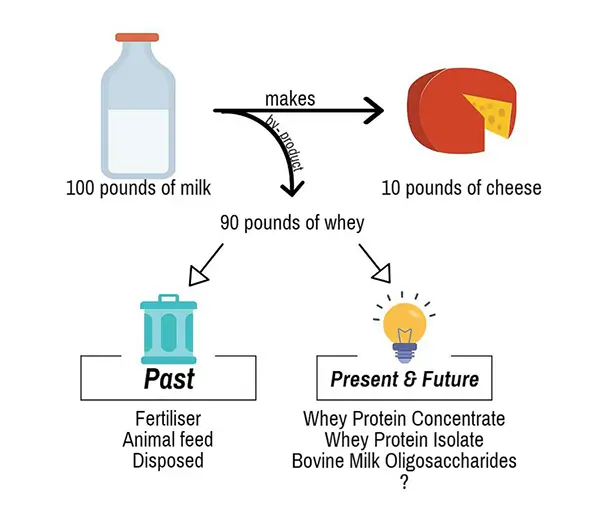
Pourquoi ne pas d'abord regarder autour du monde et voir où se trouve la protéine ? La première chose à comprendre est que toutes les protéines de cette planète sont créées par les plantes. Chaque acide aminé dans chaque cellule de chaque animal sur cette planète est dérivé des plantes qui l'ont fabriqué en premier lieu. Les animaux ne sont que des utilisateurs, et les animaux ne créent rien. Les plantes le font. Les animaux consomment des plantes, puis d'autres animaux consomment des animaux.
Il n'y a pas de débat sur les protéines végétales contre les protéines animales. Ce sont toutes des protéines végétales et cela l'a toujours été.
Dans la nature, les hominines étaient des créatures tropicales, alors où est la protéine là-bas ? Si nous regardons les espèces de nos ancêtres et les peuples indigènes d'aujourd'hui, que pouvons-nous voir ?
Si nous regardons nos vrais ancêtres, c'est-à-dire les hominidés dans les climats chauds où nous évoluons, et regardons où et combien de protéines ils obtiennent dans leur alimentation, nous nous rendrons compte que les hominines n'avaient pas un régime axé sur les protéines, seuls les Néandertaliens en avaient dans le Grand Nord en raison du climat. Cependant, pour nous, c'est une toute autre histoire.
Avant que la technologie ne permette aux humains d'aller au-dessus de 40 parallèles, que pensez-vous de la quantité de protéines que nous mangions régulièrement ?
La réponse courte serait d'environ 10 à 20 grammes en moyenne par jour. Et la totalité ou au moins 97 % des protéines étaient d'origine végétale et environ 3 % d'origine animale.
Des preuves anthropologiques montrent que pour la plupart des protéines d'évolution des hominines n'ont jamais été consommées dans la quantité que nous avons aujourd'hui. Et toutes les espèces d'hominines étaient végétaliennes et tous les primates l'étaient également. Alors, comment pouvons-nous prospérer avec des sources de protéines de faible niveau et de faible qualité ?
Ce qui se passe, c'est que nous avons une réserve d'acides aminés et lorsque nous mangeons des protéines, elles sont digérées en amines individuelles qui seraient stockées dans cette réserve. Ce dont nous avons besoin, c'est de manger différents types d'espèces végétales avec différents profils d'acides aminés et notre corps créera une protéine complète. Nous créons des protéines complètes dans notre corps afin que vous n'ayez pas à manger de protéines de copulation à l'extérieur de votre corps, juste quelques plantes différentes et c'est tout.
Pendant la majeure partie de notre évolution, soit environ 50 millions d'années, notre régime alimentaire était assez proche de celui des primates vivants d'aujourd'hui. Les besoins en protéines du régime alimentaire se situaient à un niveau qui, selon les normes actuelles, serait considéré comme gravement insuffisant, mais seulement dans les médias. Lorsque vous parlez à de vrais scientifiques qui connaissent l'autophagie, ils vous diront que même ce chiffre est plus que suffisant. Comme la plupart des bodybuilders céto-paléo et des gens ordinaires, en général, n'ont pas de formation scientifique, ils sont surtout manipulés. Je dirais que presque toutes les personnes qui pensent avoir besoin de protéines dans leur alimentation n'ont jamais entendu le mot autophagie.
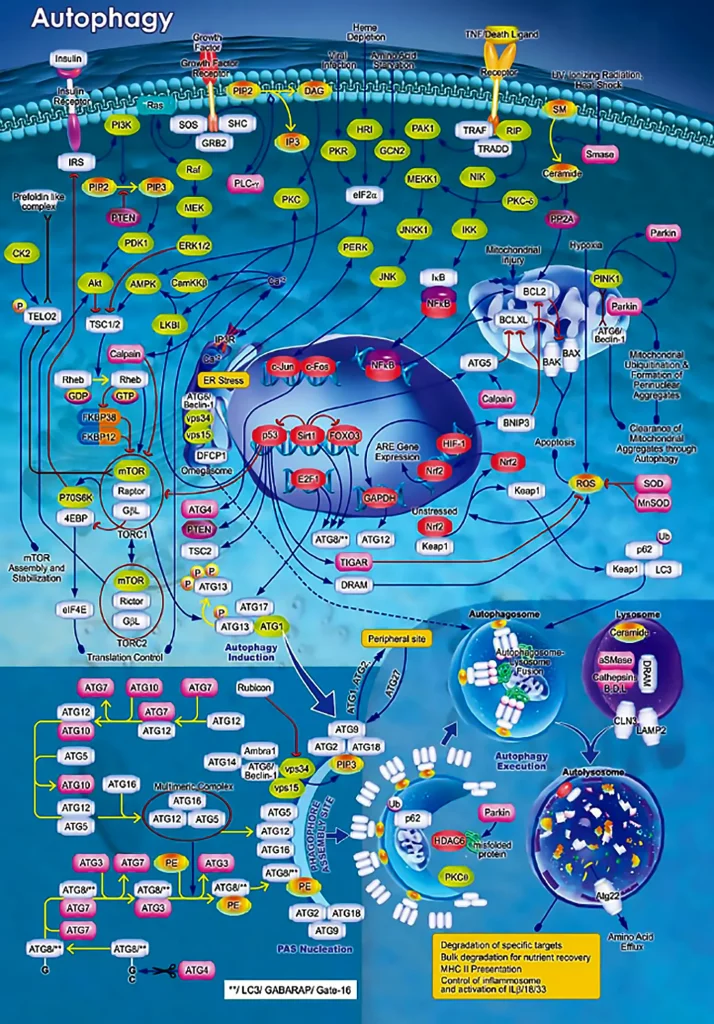
La façon dont notre corps fonctionne est que parce qu'il y a une pénurie dans la nature, nous avons évolué pour sauver tout ce qui peut être sauvé. Chaque chose que nous pouvons sauver aura une influence dramatique sur nos chances de survie dans le monde sans technologie qui a duré plus de 50 millions d'années de notre évolution. C'est la même chose avec les protéines.
Notre corps économise des protéines. C'est le processus de l'autophagie.
Cela signifie que vous vous mangez tous les jours. Chaque cellule de notre corps est constituée de protéines et lorsque les cellules meurent, elles seront recyclées. Et ce n'est pas la même chose qu'un faux recyclage comme le plastique, mais un vrai recyclage qui est efficace à 100 %. Auto signifie soi et phagy signifie manger. Nous nous mangeons tous les jours.
Les seules cellules que nous perdons physiquement sont les cellules qui ne seraient pas recyclées, notamment les cheveux, les ongles et la peau qui quittent physiquement notre corps. Tout le reste est recyclé.
Et c'est une grande vérité que la plupart des nutritionnistes et des médecins et l'ensemble du marché et de l'industrie des suppléments oublient commodément.
Nous n'avons pas besoin de protéines pour vivre. Nous recyclons les protéines. Nous devons remplacer la protéine qui a quitté notre corps sous forme de peau, de cheveux et d'ongles morts. C'est quelques grammes en une journée.
C'est la vérité.

Nous nous sommes adaptés pour économiser les acides aminés et nous nous sommes adaptés pour utiliser le recyclage des protéines à une époque de pénurie constante, mais ce que nous avons aujourd'hui est un environnement qui n'est pas conforme à notre physiologie et lorsque nous mangeons trop d'aliments riches en protéines sur une base constante, il aurait de graves conséquences sur notre santé.
Un excès de protéines créerait une signalisation hormonale excessive sous forme d'IGF-1 et de mTOR et arrêterait l'autophagie. Cela conduirait à l'accumulation de cellules défusionnées dans le temps et au développement de mutations. Ceci est corrélé non seulement au cancer, mais à un large éventail de maladies. Dans le passé, la pénurie obligeait nos ancêtres hominidés à jeûner, mais ce que nous avons aujourd'hui n'est qu'une épidémie de cancer.
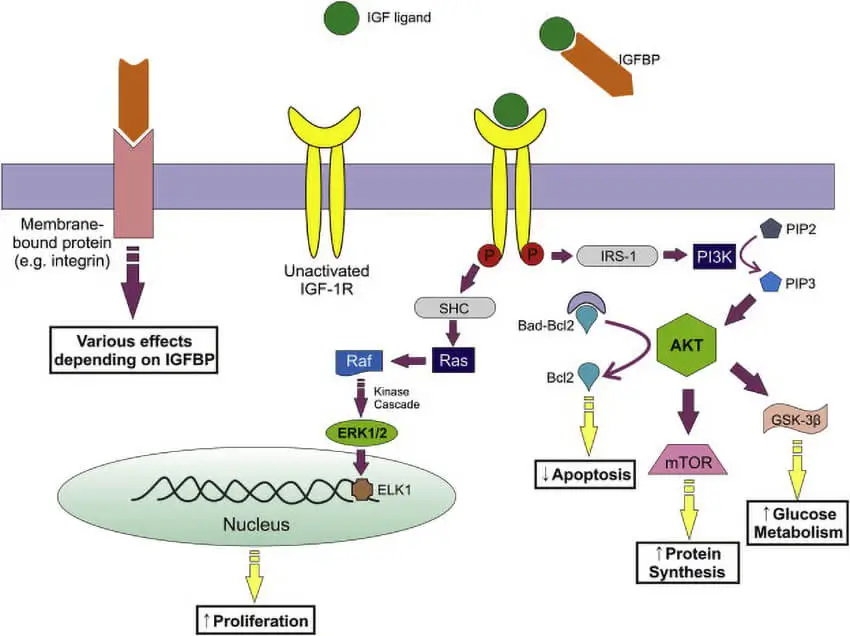
Si nous examinons les données statistiques de la médecine dans les pays développés, qu'allons-nous trouver ? La vérité est que, tout au long de l'histoire de la médecine, il n'y a eu que très peu de cas, presque négligeables, de carence en protéines. Des millions de personnes meurent de carence calorique, c'est-à-dire de faim régulière, mais la carence en protéines, en soi, avec suffisamment d'autres calories consommées, n'existe pas. Elle n'existe pas. Il n'y a qu'un seul cas dans la pratique vétérinaire lorsqu'on nourrit les vaches avec du maïs qui manque d'un acide aminé spécifique. Il y a 0,02 g de tryptophane (Trp), un acide aminé standard, dans 100 g de maïs, et le maïs n'est pas la nourriture habituelle des vaches. De faibles niveaux de tryptophane dans l'alimentation des vaches peuvent donc les rendre agitées, car le cerveau utilise le tryptophane pour produire de la sérotonine, une hormone du bonheur. Un régime à base de maïs est un régime qui rend le bétail "déprimé". C'est le seul cas de carence en acides aminés avec un apport calorique adéquat que je connaisse.
Toute cette histoire de manque d'acides aminés et d'exhaustivité n'est qu'un mythe marketing, et je ne plaisante pas. Tout a commencé dans le numéro de février 75 du magazine Vogue où certains scientifiques rémunérés ont recommandé que la combinaison de différentes protéines végétales puisse en créer une complète dont notre corps a besoin.

Le mythe des « protéines complémentaires » est né et est toujours bien vivant. Et maintenant, vous pensez toujours que les protéines végétales ne sont pas aussi bonnes, et vous avez besoin de manger des protéines complètes d'origine animale ou du moins de combiner des « protéines complémentaires » ?
Nos propres corps ont évolué pour ne pas être stupides. Nous avons une réserve de tous les acides aminés essentiels sans tenir compte de près de 90 grammes de protéines que notre corps recycle chaque jour. Même si vous voulez faire une étude pour concevoir un régime à base d'aliments végétaux entiers qui sera suffisant en calories mais insuffisant en protéines, il serait scientifiquement impossible de le faire. Nous pouvons survivre en mangeant simplement du riz ou des pommes de terre et rien d'autre indéfiniment. Pour les pommes de terre, un exemple serait l'Irlande avant la famine de la pomme de terre où il n'y avait qu'une seule culture qui réussissait à subvenir aux besoins de toute la nation, et pour le riz tout le continent asiatique.

Il pourrait y avoir un autre déficit nutritionnel, mais pas de protéines ou de tout acide aminé particulier. Même le jus de carotte contient 2 % de protéines, ce qui le rend suffisant pour la survie.
What you need to do is forget about protein. Forget that it exists. It is just a marketing scam, basically, that is what it is. You will never be deficient in protein even if you are on a fruitarian diet even if you want to design the diet to be protein deficient it is almost impossible. We and almost half of the planet until recently ate nothing but rice and had never been protein deficient.
Il n'y a pas de carence en protéines dans le monde sous-développé où le régime alimentaire est encore un régime végétalien dominé par l'amidon. Selon les normes modernes, il n'y a pas beaucoup de protéines dans le riz. Ou que diriez-vous de cela? Toutes les civilisations humaines depuis le temps ou selon une terminologie plus scientifique, de la révolution néolithique à l'époque de la découverte des engrais synthétiques il y a 70 ans, prospéraient grâce à un régime végétalien «faible en protéines» à base d'amidon. Toute la civilisation humaine pour toute l'histoire humaine.
Pourtant, pensez-vous que les protéines sont importantes?
Ok, que se passera-t-il si vous ne mangez pas de protéines sous quelque forme que ce soit pendant une année entière ? Souhaitez-vous développer Kwashiorkor ?
Nous avons 25 grammes obligatoires dont nous avons besoin, c'est ce que la science médicale conventionnelle nous dit maintenant. C'est excessif mais pour la plupart des gens, même ce nombre excessif est extrêmement faible et provoquerait en fait quelque chose que j'aime appeler l'anxiété liée aux protéines.
Que se passerait-il si nous ne mangions pas du tout de protéines pendant une année entière, pas un gramme ?
Soit dit en passant, 100 grammes de tissu ne représentent pas 100 grammes de protéines, mais environ 22 à 25. Le reste est composé d'eau et de graisse. Si vous ne mangez pas de protéines pendant un mois et que vous faites un jeûne hydrique, perdriez-vous des tissus normaux en plus de la graisse, comme la science médicale conventionnelle semble le proposer ?
Et la réponse est non.
Vous ne perdrez que de la graisse et certains acides aminés ou de la masse musculaire au départ. Et maintenant, je sais que je vais à l'encontre de toute la civilisation occidentale, alors souvenons-nous d'une étude que j'ai déjà mentionnée dans la partie 1 de la série de livres. Il y a eu le cas d'un Écossais de 27 ans souffrant d'obésité morbide, Angus Barbieri, qui a jeûné pendant une année entière sous surveillance médicale. étude (Stewart et al., 1973). Il recevait quotidiennement des suppléments de vitamines. Pas de calories, pas de protéines. Du jour 93 au jour 162, il a reçu du potassium et du jour 345 au jour 355 seulement, il a reçu 2,5 g de sel de table par jour. Aucun autre traitement médicamenteux n'a été administré.
Cependant, attendez où est la protéine?
Où sont les 25 grammes obligatoires ? Le patient a perdu 276 livres au cours de ses 382 jours de régime mais attendez comment est-il encore en vie ? Selon la science médicale, la protéine obligatoire est un must. Combien de livres de tissu musculaire a-t-il perdu si 25 grammes de protéines obligatoires correspondent à 100 grammes de tissu normal ? Le patient a-t-il développé le Kwashiorkor ?
Eh bien, il n'a pas perdu de muscle ou de tissu.
Il vient de perdre de la graisse et les protéines ont été recyclées pendant une année entière. Il a peut-être perdu une partie du muscle, mais c'est tout. Alors permettez-moi de demander à nouveau.
Combien de protéines devons-nous manger pour vivre ? Qu'en est-il de la qualité ou de l'exhaustivité de la protéine ?

Plus nous souffrirons d'un excès de protéines qui peut causer un large éventail de problèmes allant du risque accru de cancer, de la progression précipitée de la maladie coronarienne, des troubles de la fonction hépatique, des troubles de la fonction rénale et des troubles de l'homéostasie osseuse et calcique (Delimaris, 2013). La meilleure chose à faire est que je vais écrire ceci à nouveau, oubliez que vous avez déjà entendu le mot protéine.
Commencez à penser aux carences en minéraux, commencez à penser aux fibres, commencez à penser antioxydant carences.
Les légumes à feuilles vertes ne sont pas considérés comme une bonne source de protéines par qui ? L'industrie bovine.
Et les minéraux ? Les légumes à feuilles vertes ont-ils des minéraux abondants pour que nous n'ayons pas besoin de développer des mécanismes spéciaux pour essayer de les absorber activement ? Nous avons changé notre alimentation, et c'est exactement ce que nous pouvons voir dans la population moyenne. Une surabondance de protéines anticancéreuses et toxifiantes et une carence en minéraux et en fibres chez environ 97% de la population américaine. Trop de protéines, trop peu de minéraux, phytochimiques, et des fibres parce que dans le passé et ce que je veux dire 50 millions d'années d'évolution des hominines, notre alimentation était à 97 % végétale et à 3 % animale.
Références :
- Lunn, P. G., Morley, C. J., & Neale, G. (1998). A case of kwashiorkor in the UK. Clinical nutrition (Edinburgh, Scotland), 17(3), 131–133. https://doi.org/10.1016/s0261-5614(98)80007-1
- Fulgoni, V. L. (2008). Current protein intake in America: Analysis of the National Health and Nutrition Examination Survey, 2003–2004. The American Journal of Clinical Nutrition, 87(5), 1554S-1557S. https://doi.org/10.1093/ajcn/87.5.1554S
- Stewart, W. K. et Fleming, L. W. (1973). Caractéristiques d'un jeûne thérapeutique réussi d'une durée de 382 jours. Postgraduate medical journal, 49(569), 203–209. https://doi.org/10.1136/pgmj.49.569.203
- Delimaris I. (2013). Adverse Effects Associated with Protein Intake above the Recommended Dietary Allowance for Adults. ISRN nutrition, 2013, 126929. https://doi.org/10.5402/2013/126929
Articles Similaires
Vous avez des questions sur la nutrition et la santé ?
J'aimerais avoir de vos nouvelles et y répondre dans mon prochain post. J'apprécie votre contribution et votre opinion et j'ai hâte d'avoir de vos nouvelles bientôt. Je vous invite également à nous suivre sur Facebook, Instagram et Pinterest pour plus de contenu sur l'alimentation, la nutrition et la santé. Vous pouvez y laisser un commentaire et entrer en contact avec d'autres passionnés de santé, partager vos conseils et expériences, et obtenir le soutien et les encouragements de notre équipe et de notre communauté.
J'espère que ce billet a été instructif et agréable pour vous et que vous êtes prêt à mettre en pratique les connaissances que vous avez acquises. Si vous avez trouvé ce billet utile, veuillez le partager à vos amis et à votre famille qui pourraient également en bénéficier. On ne sait jamais qui peut avoir besoin de conseils et de soutien dans son parcours de santé.
– Vous pourriez aussi aimer –

Apprendre la Nutrition
Milos Pokimica est docteur en médecine naturelle, nutritionniste clinique, rédacteur en santé médicale et nutrition et conseiller en sciences nutritionnelles. Auteur de la série de livres Devenir vegetarien ? Examen des sciences, il exploite également le site Web de santé naturelle GoVeganWay.com
Avis de non-responsabilité médicale
GoVeganWay.com vous propose des critiques des dernières recherches liées à la nutrition et à la santé. Les informations fournies représentent l'opinion personnelle de l'auteur et ne sont pas destinées ni implicitement à remplacer un avis médical professionnel, un diagnostic ou un traitement. Les informations fournies sont fournies à titre informatif uniquement et ne sont pas destinées à remplacer la consultation, le diagnostic et/ou le traitement médical d'un médecin ou d'un prestataire de soins de santé qualifié.NE JAMAIS IGNORER LES CONSEILS MÉDICAUX PROFESSIONNELS OU RETARDER LA RECHERCHE DE SOINS MÉDICAUX EN RAISON DE QUELQUE CHOSE QUE VOUS AVEZ LU OU ACCÉDÉ SUR GoVeganWay.com
N'APPLIQUEZ JAMAIS DE CHANGEMENTS AU STYLE DE VIE OU TOUT CHANGEMENT À LA SUITE DE QUELQUE CHOSE QUE VOUS AVEZ LU SUR GoVeganWay.com AVANT DE CONSULTER UN PRATICIEN MÉDICAL AGRÉÉ.
En cas d'urgence médicale, appelez immédiatement un médecin ou le 911. GoVeganWay.com ne recommande ni n'approuve aucun groupe, organisation, test, médecin, produit, procédure, opinion ou autre information spécifique pouvant être mentionné à l'intérieur.
Choix de l'éditeur -
Milos Pokimica est rédacteur spécialisé dans la santé et la nutrition et conseiller en sciences nutritionnelles. Auteur d'une série de livres Devenir vegetarien ? Examen des sciences, il exploite également le site Web de santé naturelle GoVeganWay.com
Derniers articles –
Top Des Nouvelles Sur la Santé - ScienceDaily
- The overlooked nutrition risk of Ozempic and Wegovyle février 4, 2026
Popular weight-loss drugs like Ozempic and Wegovy can dramatically curb appetite, but experts warn many users are flying blind when it comes to nutrition. New research suggests people taking these medications may not be getting enough guidance on protein, vitamins, and overall diet quality, increasing the risk of muscle loss and nutrient deficiencies.
- A 25-year study found an unexpected link between cheese and dementiale février 4, 2026
A massive Swedish study tracking nearly 28,000 people for 25 years found an unexpected link between full-fat dairy and brain health. Among adults without a genetic risk for Alzheimer’s, eating more full-fat cheese was associated with a noticeably lower risk of developing the disease, while higher cream intake was tied to reduced dementia risk overall. The findings challenge decades of low-fat dietary advice but come with important caveats.
- MIT’s new brain tool could finally explain consciousnessle février 4, 2026
Scientists still don’t know how the brain turns physical activity into thoughts, feelings, and awareness—but a powerful new tool may help crack the mystery. Researchers at MIT are exploring transcranial focused ultrasound, a noninvasive technology that can precisely stimulate deep regions of the brain that were previously off-limits. In a new “roadmap” paper, they explain how this method could finally let scientists test cause-and-effect in consciousness research, not just observe […]
- Why heart disease risk in type 2 diabetes looks different for men and womenle février 4, 2026
Scientists are digging into why heart disease risk in type 2 diabetes differs between men and women—and sex hormones may be part of the story. In a large Johns Hopkins study, men with higher testosterone had lower heart disease risk, while rising estradiol levels were linked to higher risk. These hormone effects were not seen in women. The results point toward more personalized approaches to heart disease prevention in diabetes.
- Sound machines might be making your sleep worsele février 4, 2026
Sound machines may not be the sleep saviors many believe. Researchers found that pink noise significantly reduced REM sleep, while simple earplugs did a better job protecting deep, restorative sleep from traffic noise. When pink noise was combined with outside noise, sleep quality dropped even further. The results suggest that popular “sleep sounds” could be doing more harm than good—particularly for kids.
- This unexpected plant discovery could change how drugs are madele février 3, 2026
Plants make chemical weapons to protect themselves, and many of these compounds have become vital to human medicine. Researchers found that one powerful plant chemical is produced using a gene that looks surprisingly bacterial. This suggests plants reuse microbial tools to invent new chemistry. The insight could help scientists discover new drugs and produce them more sustainably.
- A hidden cellular process may drive aging and diseasele février 3, 2026
As we age, our cells don’t just wear down—they reorganize. Researchers found that cells actively remodel a key structure called the endoplasmic reticulum, reducing protein-producing regions while preserving fat-related ones. This process, driven by ER-phagy, is tied to lifespan and healthy aging. Because these changes happen early, they could help trigger later disease—or offer a chance to stop it.
PubMed, #régime-vegan –
- Diet type and the oral microbiomele février 2, 2026
CONCLUSION: The diet-oral microbiome-systemic inflammation axis is bidirectional and clinically relevant. Understanding both direct ecological regulation and indirect metabolic effects is essential to support precision nutrition strategies aimed at maintaining oral microbial balance and systemic inflammatory risk mitigation.
- Consensus document on healthy lifestylesle janvier 22, 2026
Proteins are a group of macronutrients that are vital to our lives, as they perform various functions, including structural, defensive and catalytic. An intake of 1.0-1.2 g/kg/body weight per day would be sufficient to meet our needs. Carbohydrate requirements constitute 50 % of the total caloric value and should be obtained mainly in the form of complex carbohydrates. In addition, a daily intake of both soluble and insoluble fiber is necessary. Regular consumption of extra virgin olive oil […]
- Vitamin B12 and D status in long-term vegetarians: Impact of diet duration and subtypes in Beijing, Chinale janvier 21, 2026
CONCLUSIONS: This study reveals a dual challenge among Beijing long-term vegetarians: vitamin B12 deficiency was strongly associated with the degree of exclusion of animal products from the diet (veganism), while vitamin D deficiency was highly prevalent and worsened with longer diet duration. The near-universal vitamin D deficiency observed in this study suggests that, in the Beijing context, the risk may extend beyond dietary choice, potentially reflecting regional environmental factors;…
- Nutritional evaluation of duty meals provided to riot police forces in Germanyle janvier 13, 2026
Background: The primary role of the German riot police is maintaining internal security. Due to challenging working conditions, riot police forces face an elevated risk of various diseases. During duty, forces are provided with meals. A balanced diet can reduce the risk of some of these diseases and contribute to health-promoting working conditions. Aim: First evaluation of the nutritional quality of duty meals in Germany based on German Nutrition Society recommendations (DGE). Methods: In…
- Iodinele janvier 1, 2006
Iodine is an essential trace nutrient for all infants that is a normal component of breastmilk. Infant requirements are estimated to be 15 mcg/kg daily in full-term infants and 30 mcg/kg daily in preterm infants.[1] Breastmilk iodine concentration correlates well with maternal urinary iodine concentration and may be a useful index of iodine sufficiency in infants under 2 years of age, but there is no clear agreement on a value that indicates iodine sufficiency, and may not correlate with […]
Messages aléatoires –
Postes en vedette -
Dernières Nouvelles de PubMed, #alimentation végétale –
- From paddy soil to dining table: biological biofortification of rice with zincpar Lei Huang le février 4, 2026
One-third of paddy soils are globally deficient in zinc (Zn) and 40% of Zn loss in the procession from brown rice to polished rice, which results in the global issue of hidden hunger, e.g., the micronutrient deficiencies in the rice-based population of developing countries. In the recent decades, biofortification of cereal food crops with Zn has emerged as a promising solution. Herein, we comprehensively reviewed the entire process of Zn in paddy soil to human diet, including the regulatory…
- Molecular Characterization of Tobacco Necrosis Virus A Variants Identified in Sugarbeet Rootspar Alyssa Flobinus le février 3, 2026
Sugarbeet provides an important source of sucrose; a stable, environmentally safe, and low-cost staple in the human diet. Viral diseases arising in sugarbeet ultimately impact sugar content, which translates to financial losses for growers. To manage diseases and prevent such losses from occurring, it is essential to characterize viruses responsible for disease. Recently, our laboratory identified a tobacco necrosis virus A variant named Beta vulgaris alphanecrovirus 1 (BvANV-1) in sugarbeet…
- Nutrition in early life interacts with genetic risk to influence preadult behaviour in the Raine Studypar Lars Meinertz Byg le février 3, 2026
CONCLUSIONS: Nutrition in early life and psychiatric genetic risk may interact to determine lasting child behaviour. Contrary to our hypothesis, we find dietary benefits in individuals with lower ADHD PGS, necessitating replication. We also highlight the possibility of including genetics in early nutrition intervention trials for causal inference.
- Effect of the gut microbiota on insect reproduction: mechanisms and biotechnological prospectspar Dilawar Abbas le février 2, 2026
The insect gut microbiota functions as a multifunctional symbiotic system that plays a central role in host reproduction. Through the production of bioactive metabolites, gut microbes interact with host hormonal pathways, immune signaling, and molecular regulatory networks, thereby shaping reproductive physiology and fitness. This review summarizes recent advances in understanding how gut microbiota regulate insect reproduction. Accumulating evidence demonstrates that microbial metabolites…
- Rationale and design of a parallel randomised trial of a plant-based intensive lifestyle intervention for diabetes remission: The REmission of diabetes using a PlAnt-based weight loss InteRvention…par Brighid McKay le février 2, 2026
CONCLUSIONS: This trial will provide high-quality clinical evidence on the use of plant-based ILIs to address the epidemics of obesity and diabetes to inform public health policies and programs in Canada and beyond.
- Diet type and the oral microbiomepar Daniel Betancur le février 2, 2026
CONCLUSION: The diet-oral microbiome-systemic inflammation axis is bidirectional and clinically relevant. Understanding both direct ecological regulation and indirect metabolic effects is essential to support precision nutrition strategies aimed at maintaining oral microbial balance and systemic inflammatory risk mitigation.
